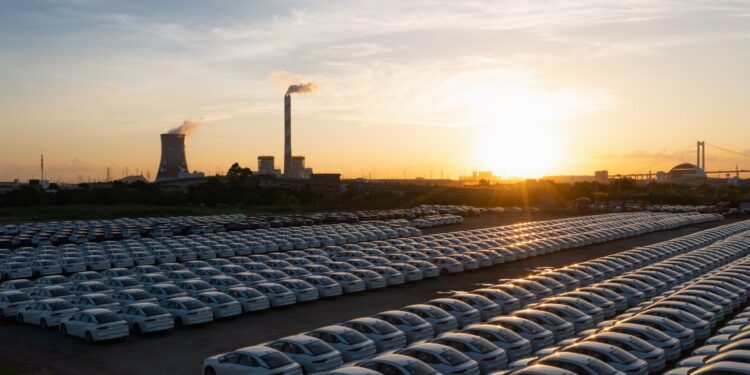Electric vehicle sales, which were on a promising path, are showing signs of decline, raising concerns about their continued expansion according to a recent report from Bloomberg. Recent data indicates that the industry is facing challenges, most notably the decline or cancellation of government support, and weak consumer demand, which is prompting car manufacturers to rethink their strategies and expectations.
Despite the strong start of the industry over the past years, the past and current years have witnessed a noticeable decline in orders for electric cars in major markets such as Europe and North America.
According to the report, global sales of electric and hybrid cars recorded an increase of 62% in 2022 after doubling in 2021. However, growth slowed to 31% last year, as China was the main driver, accounting for 59% of sales globally, excluding vehicles. Commercial.
Europe and the United States witnessed a decline in the market share of electric cars, as the share in Europe fell to 14% last August, compared to 15% a year ago.
In Germany, the continent’s largest market, electric car sales fell by 69%.
In the United States, research firm J.D. Burr expects electric models to account for only 9% of sales this year, compared to a previous estimate of 12.4%, according to Bloomberg.
What causes this slowdown?
The agency indicates that several factors contributed to this decline in electric car sales, which are summarized as follows:
- One of the biggest problems is the removal of government subsidies, which made electric cars less expensive compared to their gas-powered counterparts.
- The Bloomberg report indicated that fully electric cars are still 30% and 27% more expensive in Europe and the United States, respectively, compared to gasoline-powered cars. This financial barrier has deterred more cost-conscious consumers from switching to electric vehicles.
- Additionally, the lack of EV charging infrastructure, especially in the US, has added to buyers’ hesitation.
Reevaluate
In response to these market challenges, many major automakers have adjusted their electric vehicle goals. For example, the American giant Ford canceled its plans to produce a three-row electric SUV and postponed the release of a new truck, which led to its spending on electric cars reducing to 30% of annual capital spending compared to 40% previously.
Likewise, Volkswagen – the largest car manufacturer in Europe – is facing tense negotiations over the possibility of closing two factories in Germany due to the decline in electric car sales. Overall, automakers now target selling 23.7 million electric vehicles by 2030, which is more than 3 million units fewer than expected the previous year.
Even Tesla, a pioneer in the electric car industry, has stopped short of mentioning its ambitious goal of delivering 20 million electric cars annually by 2030, indicating that the most powerful player in the electric car market is reconsidering the pace of the transition towards electrification.
Automotive industry and climate
The slowdown in electric car sales raises great concern, according to the agency, because land transportation represents about 15% of global greenhouse gas emissions, making the switch to electric cars a fundamental pillar for achieving net-zero climate goals.
The decline in demand has also affected related industries, such as Northvolt AB, the leading European battery manufacturer, which recently announced a 20% reduction in its global workforce and halted expansion plans due to slowing demand for electric vehicles. This highlights the potential impact on job losses and the economic impact associated with the health of the electric vehicle market.
China and competitive advantage
China has gained a significant advantage in technology and manufacturing of electric cars over car manufacturers in Europe and the United States. The cost of electric car batteries in China fell to $126 per kilowatt-hour on average, compared to an increase of 11% in the United States and 20% in Europe. This pricing superiority has allowed Chinese companies, such as BYD, to launch more advanced and less expensive battery technologies, strengthening their grip on the global electric vehicle market, according to a Bloomberg report.
Is there hope on the horizon?
In light of the recent slowdown, some governments are considering reintroducing financial incentives to boost electric vehicle sales. On the other hand, car manufacturers are introducing more expensive models to attract hesitant buyers.
The Transport and Environment Group expected that 7 new electric models costing less than 25,000 euros ($27,810) would arrive in the European market by the end of this year and next year, which could boost the share of electric cars in the European market to 24% in 2025. , compared to 12.5% during the first seven months of 2024.



